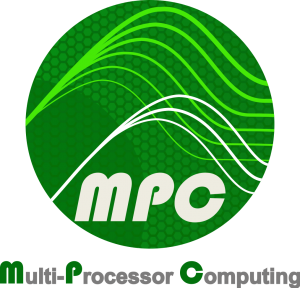The MPC (Multi-Processor Computing) framework provides a unified parallel runtime designed to improve the scalability and performances of applications running on clusters of (very) large multiprocessor/multicore NUMA nodes.
Thanks to its design, MPC allows mixed-mode programming models and efficient interaction with the HPC software stack.
MPC is available under the CeCILL-C license, which is a French transposition of the LGPL and is fully LGPL-compatible.
Supported Parallel Programming APIs
MPC provides implementations for the MPI, OpenMP and POSIX Threads standards. All these standards can be mixed together in an efficient way, thanks to process virtualization. MPC has been ported on x86 and x86_64 with Linux system, and supports TCP, InfiniBand and Portals4 interconnects.
MPI
MPC provides its own MPI implementation, and fully respects the MPI 3.1 standard, such as an efficient MPI_THREAD_MULTIPLE support, a full MPI I/O support, a full non-blocking collectives support and an efficient Generalized requests support.
MPC provides a thread-based MPI implementation (e.g MPI processes are threads and not OS processes). MPC’s communications are implemented in the following way: intra-node communications involve several MPI Processes in a unique OS process (MPC’s default mode uses one OS process per node). These MPI Processes use the optimized thread-scheduler polling method and thread-scheduler integrated collectives to communicate with each other. As far as inter-node communications are concerned, MPC uses direct access to the TCP, InfiniBand or Portals4 interconnect. MPC provides performances close to MPICH or OpenMPI, but with a much better support of hybrid programming models (e.g., MPI/PThreads, MPI/OpenMP, …) and lower memory consumption.
MPC also provides a process-based way of using its MPI implementation.
OpenMP
MPC provides its own OpenMP implementation, and fully respects the OpenMP 3.1 standard. MPC allows compilation and execution of C/C++ and Fortran OpenMP applications thanks to GNU and Intel compilers support. The main MPC package contains a patched version of GCC (6.2) called MPC_GCC which is automatically installed when building MPC. The OpenMP implementation is also compatible with Intel C/C++ and FORTRAN compilers starting at version 15.0.
The OpenMP runtime has been optimized to efficiently support large NUMA architectures and hybrid MPI/OpenMP codes.
Thread Library
MPC comes with its own MxN thread library and POSIX Thread implementation. MxN thread libraries provide lightweight user-level threads that are mapped to kernel threads. One key advantage of the MxN approach is the ability to optimize the user-level thread scheduler to create and schedule a very large number of threads with a reduced overhead. The MPC thread scheduler provides a polling method that avoids busy-waiting and keeps a high level of reactivity for communications, even when the number of tasks is much larger than the number of available CPU cores. Furthermore, collective communications are integrated into the thread scheduler to enable efficient barrier, reduction and broadcast operations.
Features
Thread debugging
Support for debugging user-level MPC threads is provided thanks to an implementation of the libthread_db and a patch to the GNU Debugger (GDB). It allows to manage user-level threads in GDB and all GUIs based on GDB. MPC is also compatible with Allinea’s DDT Debugger.
Thread safety
Because MPC provides a thread-based MPI implementation, a mechanism is needed to deal with global-variable sharing in the application.
Such thread-safety issues are managed with automatic privatization of global variables. This mechanism is automatically appplied by the compiler for C/C++ and Fortran MPI codes through the new -fmpc-privatize option. This new option is available in MPC_GCC (provided with the MPC package) and Intel compilers (starting with version 15.0 for C/C++ and Fortran).
Memory Allocator
The MPC thread library comes with a thread-aware and NUMA-aware memory allocator (malloc, calloc, realloc, free, memalign and posix_memalign). It implements a per-thread heap to avoid contention during allocation and to maintain data locality on NUMA nodes. Each new data allocation is first performed by a lock-free algorithm on the thread private heap. If this local private heap is unable to provide a new memory block, the requesting thread queries a large page to the second-level global heap with a synchronization scheme. A large page is a parametrized number of system pages. Memory deallocation is locally performed in each private heap. When a large page is totally free, it is returned to the second-level global heap with a lock-free method. Pages in second-level global heap are virtual and are not necessarily backed by physical pages. On a same node, memory pages freed by a thread are provided to new allocations of other threads without any system call.
Hierarchical Local Storage (HLS)
HLS is a set of directives in C, C++ and Fortran allowing the application developer to share global variables across MPI tasks running on a same node. The HLS extension can be used to reduce the memory footprint of MPI programs by avoiding to duplicate data that are common to all MPI tasks. One typical use case of HLS variables is a large table of physical constants. With the HLS extension, only one table per node will be allocated instead of one table per core (if there is one MPI task per core) thus reducing the memory consumption by a factor equal to the number of cores per node.
